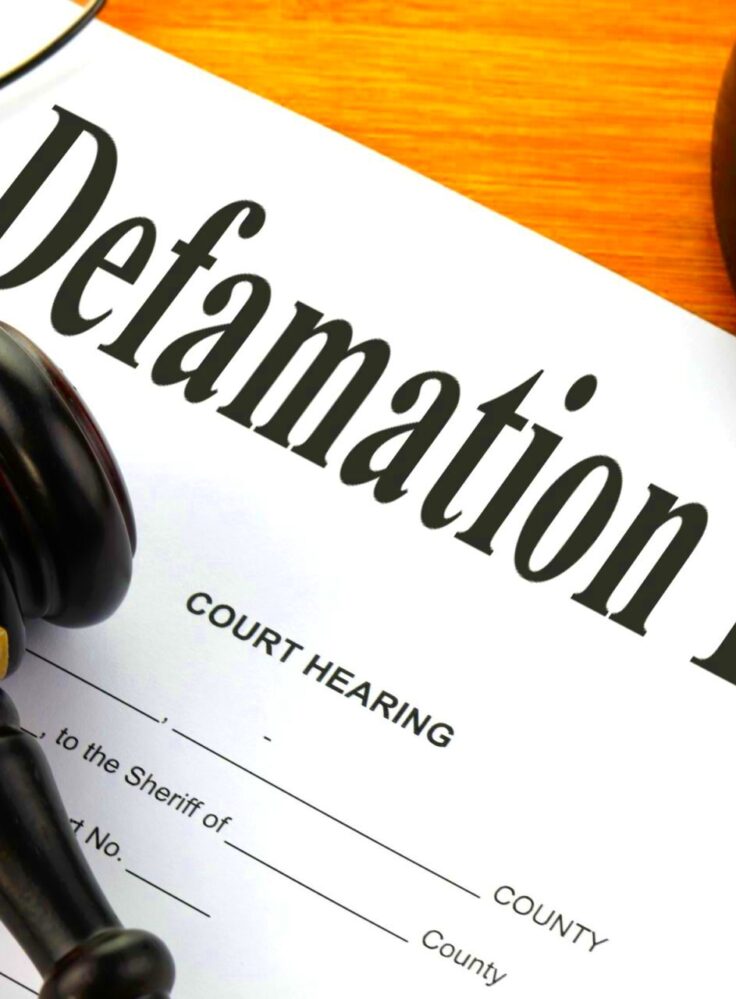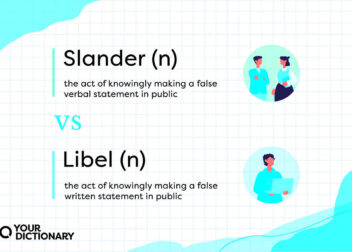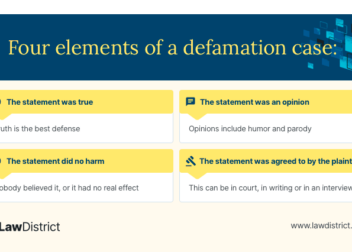Colorado’s Liability Laws for Defamation and Slander
One such legal term to denote hurting someone’s reputation is defamation. There are two different types of defamation in Colorado; slander and libel. The spoken statements fall under slander whereas written or published statements fall under libel. These forms of derogation can affect an individual’s life; personal relations and job prospects can be impacted as well. Anyone dealing with matters related to maintaining a good public image must understand the intricacies of such terminologies.
Overview of Colorado’s Defamation Laws
Defamation laws of Colorado are made for individual and institutional protection against false declarations that may hurt their name. Hence, under Colorado law, it may be possible for someone to file a defamation suit if they think that a false statement has been directed towards them by someone else which in turn affected their reputation negatively. Here are some aspects you may want to remember:
- Types of Defamation: As mentioned, defamation can be either slander or libel.
- Burden of Proof: The burden typically lies with the plaintiff to prove that the statement was false and damaging.
- Public Figures: Public figures have a higher burden to prove actual malice, which means they must show that the false statement was made with knowledge of its falsity or with reckless disregard for the truth.
For anyone engaged in a defamation lawsuit, either as plaintiff or defendant, understanding these laws is crucial.
Key Elements of a Defamation Claim in Colorado
To win a defamation suit in Colorado, a plaintiff must prove certain important components:
- False Statement: The plaintiff must prove that the defendant made a false statement about them.
- Publication: The statement must have been published or communicated to a third party.
- Fault: Depending on the status of the plaintiff (public figure or private individual), the plaintiff must show that the defendant acted with negligence or actual malice.
- Damages: The plaintiff must demonstrate that the false statement caused actual harm, which could include lost income, emotional distress, or damage to reputation.
When it comes to defamation claims, it’s worth mentioning that truth serves as an unconditional shield. If the assertion is ultimately shown to be accurate, usually the case will be unsuccessful. A comprehension of these components enables people to effectively maneuver through the intricacies of Colorado’s defamation statute.
Differences Between Defamation and Slander
In talking over the problems of reputation that have legal ramifications, it is critical to establish a difference between defamation and slander. Although the two expressions signify causing harm to another person’s name by utterances that are not true, they are not interchangeable. Realization of these distinctions helps people comprehend their circumstance and select suitable judicial channels to follow.
A brief analysis of their differences is provided below:
| Aspect | Defamation | Slander |
|---|---|---|
| Definition | False statements harming someone’s reputation, can be in written or spoken form. | Specifically refers to spoken defamatory statements. |
| Medium | Includes written statements, such as articles, books, or social media posts. | Involves verbal statements made in conversation or speech. |
| Proof of Damage | Damage is often presumed, especially in cases of libel. | Requires proof of actual damages since it’s more challenging to prove harm from spoken words. |
| Examples | A newspaper article falsely accusing someone of a crime. | Gossip shared verbally at a gathering, stating someone is dishonest. |
To put it another way, not all defamation is slander; but all slander is defamation. Differentiating between these terms is important for anunderstanding the law regarding protection of reputation.
Legal Defenses Against Defamation Claims
Defamation claims can be serious and complex, however, defenders have some legal strategies to use. Knowing how to defend oneself is important for all those who are part of such cases.
This is a list of some common defenses against defamation claims:
- Truth: If the statement in question is true, it is an absolute defense against defamation. This defense holds strong in court, regardless of the harm caused.
- Opinion: Statements of opinion rather than facts cannot be deemed defamatory. For instance, saying “I think he’s a terrible actor” may be seen as a personal opinion rather than a false statement.
- Privileged Communication: Certain communications are protected by privilege, such as statements made during judicial proceedings or legislative debates. These statements cannot be the basis for a defamation claim.
- Consent: If the person being defamed consented to the publication of the statement, they cannot later claim defamation.
- Public Interest: Statements made in the public interest may be protected, especially if the speaker acted in good faith and had a reasonable basis for the statement.
These defenses can help individuals and businesses understand the ins and outs of suits concerning defamation more easily.
Damages in Defamation Cases
It is imperative for the plaintiff to prove damages in an action for defamation. Moreover, damages refer to the personal harm done to persons by means of said libelous remarks. Knowing about these categories may assist people in realizing how a defamation suit may affect them adversely.
In almost every case of defamation, the claims fall into three main categories of damages:
- General Damages: These are damages presumed to occur as a direct result of the defamatory statement. They include harm to reputation, emotional distress, and loss of societal standing.
- Special Damages: These are actual, quantifiable financial losses that result directly from the defamation. For example, if a person loses their job due to a defamatory statement, they can claim lost wages as special damages.
- Punitive Damages: These damages are awarded to punish the defendant for particularly egregious behavior and to deter others from making similar statements. Punitive damages are not guaranteed and typically require proof of actual malice.
To get compensated, a plaintiff in Colorado must show evidence of the damages that he or she has suffered. Knowing the different kinds of such damages can help in making decisions when it comes to taking or defending a case of defamation.
Filing a Defamation Lawsuit in Colorado
If you think that you have been subjected to defamatory statements in Colorado, knowing the procedural means of bringing a suit is essential. It can be complicated but simplifying it into stages makes it easier to grasp. This is a step-by-step guide on how to navigate through legal territory when contemplating a defamation case.
The following are the general steps associated with raising a complaint of defamation:
- Consult a Lawyer: It’s always wise to start by consulting with an attorney who specializes in defamation law. They can provide personalized advice based on your situation.
- Gather Evidence: Collect any evidence that supports your claim, including written statements, recordings, or witnesses who can corroborate your story.
- Determine the Type of Defamation: Identify whether your claim falls under slander (spoken) or libel (written) to ensure you follow the correct legal procedures.
- File a Complaint: Your attorney will help you draft and file a formal complaint with the appropriate court, outlining your allegations and the damages you seek.
- Engage in Discovery: Both parties will exchange evidence and information during the discovery phase. This step is vital for building your case.
- Negotiate a Settlement: Many defamation cases settle out of court. Be prepared for negotiations, as this can save time and resources.
- Trial: If a settlement is not reached, your case may go to trial where both sides present their arguments, and a judge or jury makes the final decision.
Although going through the motions of filing such a case may seem scary, knowing what steps to follow makes one strong enough in asking for equity.
Frequently Asked Questions about Defamation and Slander in Colorado
People commonly ask the same questions about defamation and slander. Understanding the legal principles involved will often demystify the process. Some of these frequently asked questions include:
- What is the time limit for filing a defamation lawsuit in Colorado?
In Colorado, you generally have one year from the date of the defamatory statement to file a lawsuit. - Do I need to prove damages?
Yes, you must demonstrate that the false statement caused you harm, either to your reputation, emotionally, or financially. - Can I sue for defamation if I am a public figure?
Yes, but you will need to prove actual malice, meaning the statement was made with knowledge of its falsity or reckless disregard for the truth. - What if the statement was true?
Truth is an absolute defense in defamation cases. If the statement can be proven true, you cannot successfully claim defamation. - Can I sue for slander if I didn’t lose any money?
You can still file a claim, but proving damages may be more challenging if you have not incurred any financial loss.
Navigating through the complexities of defamation and slander cases in Colorado is possible through understanding these frequent inquiries.
Conclusion on Colorado’s Liability Laws for Defamation and Slander
Getting around the waters of libelo and slander in Colorado is difficult, but knowledge is power. Knowing the differences between slander and defamation, the essential elements to establish a claim, and the available legal defenses may make a case’s outcome entirely different. Clarifying whether you need to sue or defend against it in court requires understanding Colorado’s liability laws.
In conclusion, the legal system of Colorado opens up a way for people who have been hurt by false claims to find justice while at the same time, it protects individuals from unnecessary law suits on their opinions. Having a well versed lawyer can help you maneuver through this complex domain and fight for your rights tactfully. It’s important to note that your name is precious and it is vital you know how to safeguard it.


